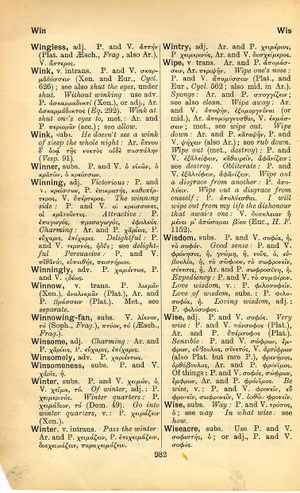wink: Difference between revisions
Ὥσπερ αὐτοῦ τοῦ ἡλίου μὴ ὄντος καυστικοῦ, ἀλλ' οὔσης ζωτικῆς καὶ ζωοποιοῦ θέρμης ἐν αὐτῷ καὶ ἀπλήκτου, ὁ ἀὴρ παθητικῶς δέχεται τὸ ἀπ' αὐτοῦ ϕῶς καὶ καυστικῶς· οὕτως οὖν ἁρμονίας οὔσης ἐν αὐτοῖς τινὸς καὶ ἑτέρου εἴδους ϕωνῆς ἡμεῖς παθητικῶς ἀκούομεν → Just as although the Sun itself does not cause burning but has a heat in it that is life-giving, life-engendering, and mild, the air receives light from it by being affected and burned, so also although there is a certain harmony and a different kind of voice in them, we hear it by being affected.
(CSV5) |
m (Text replacement - "<b class="b2">Vesp.</b>" to "''Vesp.''") |
||
| Line 10: | Line 10: | ||
'''subs.''' | '''subs.''' | ||
<b class="b2">He doesn't see a wink of sleep the whole night</b>: Ar. ὕπνου δʼ ὁρᾷ τῆς νυκτὸς οὐδὲ πασπάλην ( | <b class="b2">He doesn't see a wink of sleep the whole night</b>: Ar. ὕπνου δʼ ὁρᾷ τῆς νυκτὸς οὐδὲ πασπάλην (''Vesp.'' 91). | ||
}} | }} | ||
Revision as of 11:45, 7 August 2017
English > Greek (Woodhouse)
v. intrans.
P. and V. σκαρμαδύσσειν (Xen. also Eur., Cycl. 626); see also, shut the eyes, under shut.
Without winking: use adv. P. ἀσκαρμαδυκτί (Xen.), or adj., Ar. ἀσκαρμάδυκτος (Eq. 292).
Wink at, shut one's eyes to, met.: Ar. and P. περιορᾶν (acc.); see allow.
subs.
He doesn't see a wink of sleep the whole night: Ar. ὕπνου δʼ ὁρᾷ τῆς νυκτὸς οὐδὲ πασπάλην (Vesp. 91).

